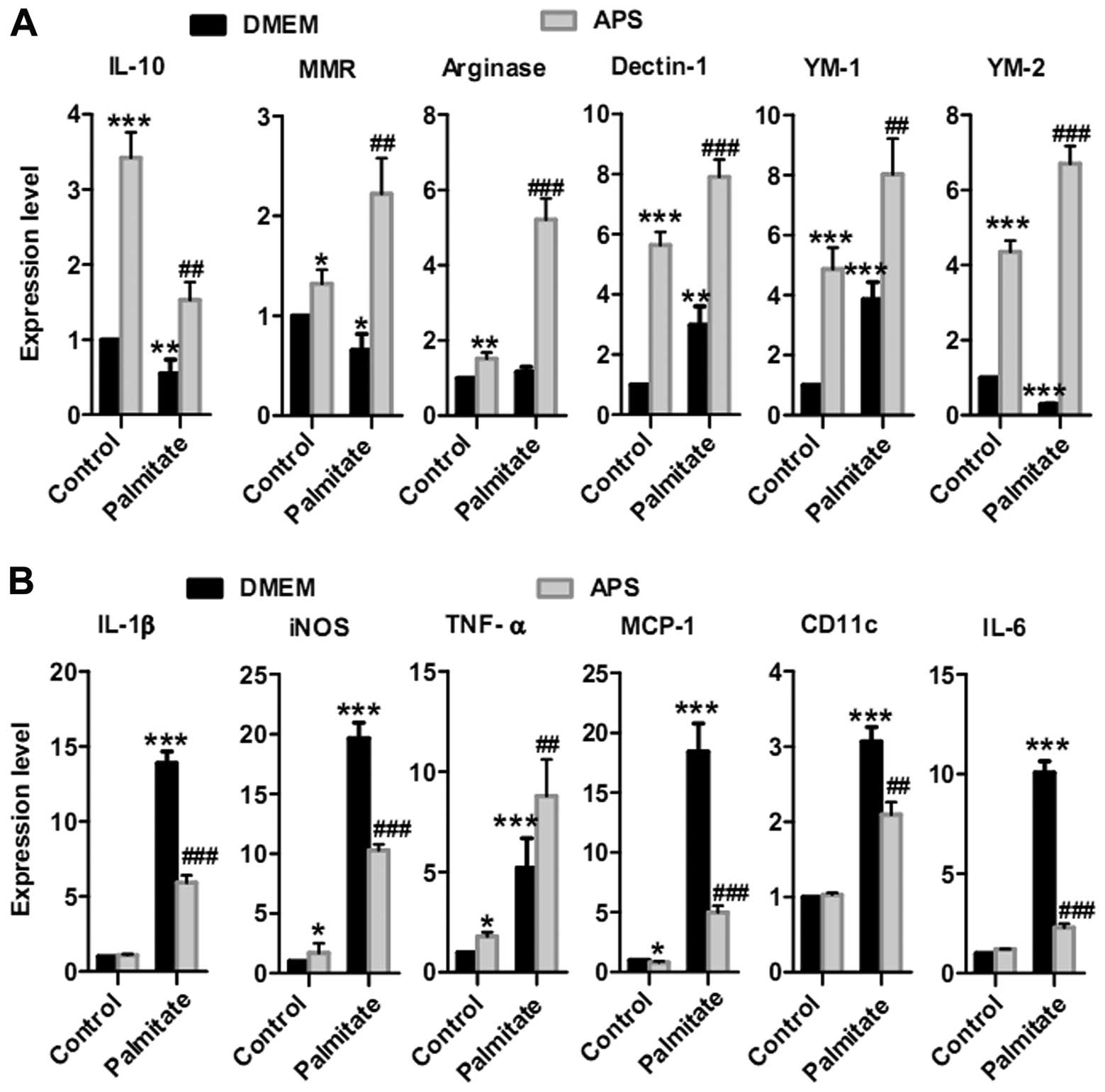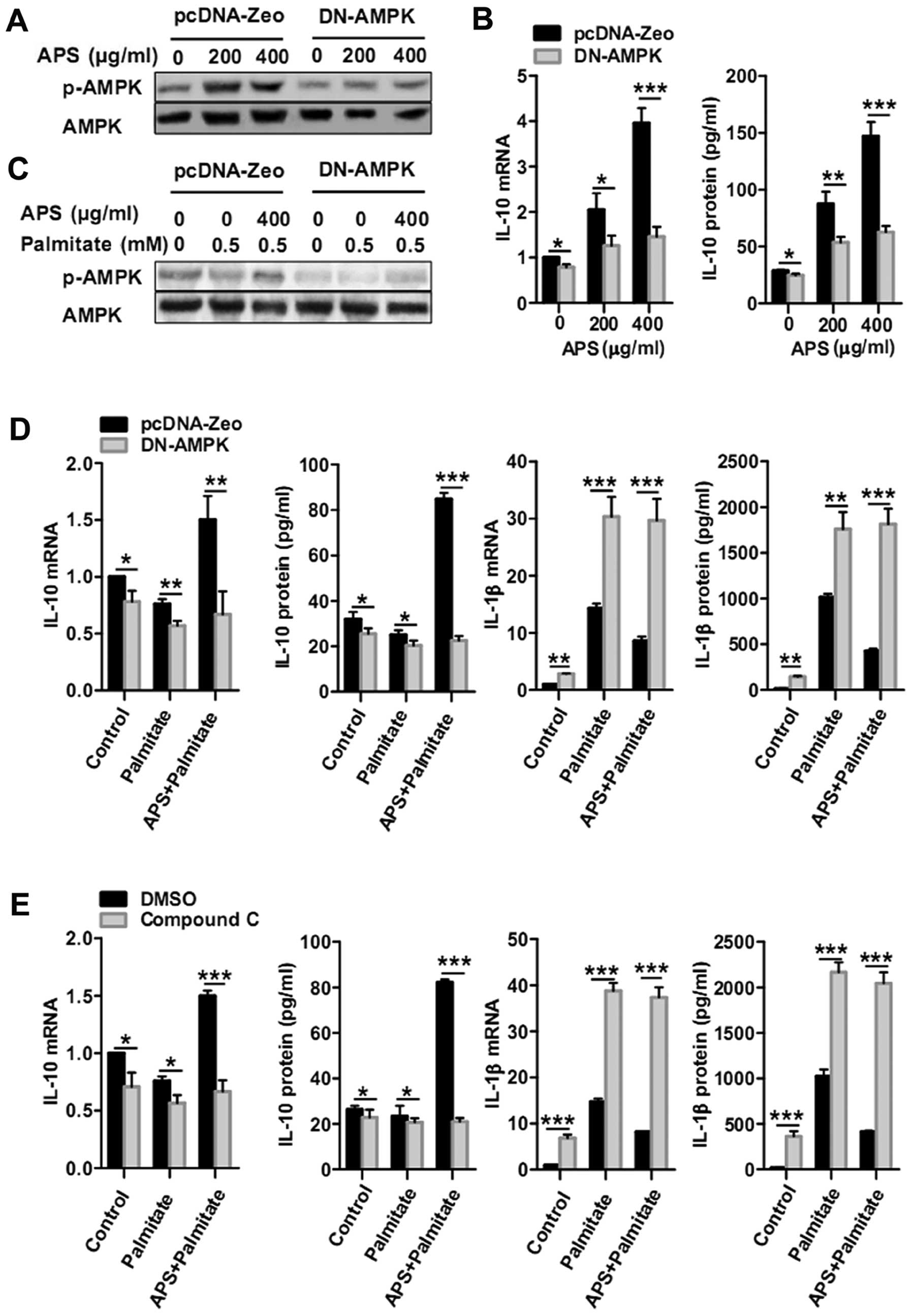|
1
|
Greenfield JR and Campbell LV:
Relationship between inflammation, insulin resistance and type 2
diabetes: ‘cause or effect’? Curr Diabetes Rev. 2:195–211.
2006.
|
|
2
|
Permana PA, Menge C and Reaven PD:
Macrophage-secreted factors induce adipocyte inflammation and
insulin resistance. Biochem Biophys Res Commun. 341:507–514. 2006.
View Article : Google Scholar : PubMed/NCBI
|
|
3
|
Bray GA, Lovejoy JC, Smith SR, et al: The
influence of different fats and fatty acids on obesity, insulin
resistance and inflammation. J Nutr. 132:2488–2491. 2002.PubMed/NCBI
|
|
4
|
Samokhvalov V, Bilan PJ, Schertzer JD,
Antonescu CN and Klip A: Palmitate- and
lipopolysaccharide-activated macrophages evoke contrasting insulin
responses in muscle cells. Am J Physiol Endocrinol Metab.
296:E37–E46. 2009. View Article : Google Scholar : PubMed/NCBI
|
|
5
|
Nguyen MT, Favelyukis S, Nguyen AK, et al:
A subpopulation of macrophages infiltrates hypertrophic adipose
tissue and is activated by free fatty acids via Toll-like receptors
2 and 4 and JNK-dependent pathways. J Biol Chem. 282:35279–35292.
2007. View Article : Google Scholar : PubMed/NCBI
|
|
6
|
Jeong HW, Hsu KC, Lee JW, et al: Berberine
suppresses proinflammatory responses through AMPK activation in
macrophages. Am J Physiol Endocrinol Metab. 296:E955–E964. 2009.
View Article : Google Scholar : PubMed/NCBI
|
|
7
|
Denzler KL, Waters R, Jacobs BL, Rochon Y
and Langland JO: Regulation of inflammatory gene expression in
PBMCs by immunostimulatory botanicals. PLoS One. 5:e125612010.
View Article : Google Scholar : PubMed/NCBI
|
|
8
|
Chen W, Xia YP, Chen WJ, Yu MH, Li YM and
Ye HY: Improvement of myocardial glycolipid metabolic disorder in
diabetic hamster with Astragalus polysaccharide treatment. Mol Biol
Rep. 39:7609–7615. 2012. View Article : Google Scholar : PubMed/NCBI
|
|
9
|
Liu M, Wu K, Mao X, Wu Y and Ouyang J:
Astragalus polysaccharide improves insulin sensitivity in KKAy
mice: regulation of PKB/GLUT4 signaling in skeletal muscle. J
Ethnopharmacol. 127:32–37. 2010. View Article : Google Scholar : PubMed/NCBI
|
|
10
|
Chen W, Li Y and Yu M: Astragalus
polysaccharides: an effective treatment for diabetes prevention in
NOD mice. Exp Clin Endocrinol Diabetes. 116:468–474. 2008.
View Article : Google Scholar : PubMed/NCBI
|
|
11
|
Li RJ, Qiu SD, Chen HX, Tian H and Wang
HX: The immunotherapeutic effects of Astragalus polysaccharide in
type 1 diabetic mice. Biol Pharm Bull. 30:470–476. 2007. View Article : Google Scholar : PubMed/NCBI
|
|
12
|
Zou F, Mao XQ, Wang N, Liu J and Ou-Yang
JP: Astragalus polysaccharides alleviate glucose toxicity and
restores glucose homeostasis in diabetic states via activation of
AMPK. Acta Pharmacol Sin. 30:1607–1615. 2009. View Article : Google Scholar : PubMed/NCBI
|
|
13
|
Sag D, Carling D, Stout RD and Suttles J:
Adenosine 5′-monophosphate-activated protein kinase promotes
macrophage polarization to an anti-inflammatory functional
phenotype. J Immunol. 181:8633–8641. 2008.
|
|
14
|
Shon YH, Kim JH and Nam KS: Effect of
Astragali radix extract on lipopolysaccharide-induced inflammation
in human amnion. Biol Pharm Bull. 25:77–80. 2002. View Article : Google Scholar : PubMed/NCBI
|
|
15
|
He X, Shu J, Xu L, Lu C and Lu A:
Inhibitory Effect of Astragalus polysaccharides on
lipopolysaccharide-induced TNF-α and IL-1β production in THP-1
cells. Molecules. 17:3155–3164. 2012.PubMed/NCBI
|
|
16
|
Zhao LH, Ma ZX, Zhu J, Yu XH and Weng DP:
Characterization of polysaccharide from Astragalus radix as the
macrophage stimulator. Cell Immunol. 271:329–334. 2011. View Article : Google Scholar : PubMed/NCBI
|
|
17
|
Lee KY and Jeon YJ: Macrophage activation
by polysaccharide isolated from Astragalus membranaceus. Int
Immunopharmacol. 5:1225–1233. 2005. View Article : Google Scholar : PubMed/NCBI
|
|
18
|
Wang N, Zhang D, Mao X, Zou F, Jin H and
Ouyang J: Astragalus polysaccharides decreased the expression of
PTP1B through relieving ER stress induced activation of ATF6 in a
rat model of type 2 diabetes. Mol Cell Endocrinol. 307:89–98. 2009.
View Article : Google Scholar : PubMed/NCBI
|
|
19
|
Schmitz-Peiffer C, Craig DL and Biden TJ:
Ceramide generation is sufficient to account for the inhibition of
the insulin-stimulated PKB pathway in C2C12 skeletal muscle cells
pretreated with palmitate. J Biol Chem. 274:24202–24210. 1999.
View Article : Google Scholar
|
|
20
|
Lefevre L, Gales A, Olagnier D, et al:
PPARgamma ligands switched high fat diet-induced macrophage M2b
polarization toward M2a thereby improving intestinal Candida
elimination. PLoS One. 5:e128282010. View Article : Google Scholar : PubMed/NCBI
|
|
21
|
Oh DY, Talukdar S, Bae EJ, et al: GPR120
is an omega-3 fatty acid receptor mediating potent
anti-inflammatory and insulin-sensitizing effects. Cell.
142:687–698. 2010. View Article : Google Scholar : PubMed/NCBI
|
|
22
|
Hong EG, Ko HJ, Cho YR, et al:
Interleukin-10 prevents diet-induced insulin resistance by
attenuating macrophage and cytokine response in skeletal muscle.
Diabetes. 58:2525–2535. 2009. View Article : Google Scholar : PubMed/NCBI
|
|
23
|
Gabay C, Lamacchia C and Palmer G: IL-1
pathways in inflammation and human diseases. Nat Rev Rheumatol.
6:232–241. 2010. View Article : Google Scholar : PubMed/NCBI
|
|
24
|
Speaker KJ and Fleshner M: Interleukin-1
beta: a potential link between stress and the development of
visceral obesity. BMC Physiol. 12:82012. View Article : Google Scholar : PubMed/NCBI
|
|
25
|
Schimmack G, Defronzo RA and Musi N:
AMP-activated protein kinase: role in metabolism and therapeutic
implications. Diabetes Obes Metab. 8:591–602. 2006. View Article : Google Scholar : PubMed/NCBI
|
|
26
|
Hattori Y, Suzuki K, Hattori S and Kasai
K: Metformin inhibits cytokine-induced nuclear factor kappaB
activation via AMP-activated protein kinase activation in vascular
endothelial cells. Hypertension. 47:1183–1188. 2006. View Article : Google Scholar
|
|
27
|
Yuan Y, Sun M and Li KS: Astragalus
mongholicus polysaccharide inhibits lipopolysaccharide-induced
production of TNF-alpha and interleukin-8. World J Gastroenterol.
15:3676–3680. 2009. View Article : Google Scholar : PubMed/NCBI
|
|
28
|
Jiang JB, Qiu JD, Yang LH, He JP, Smith GW
and Li HQ: Therapeutic effects of astragalus polysaccharides on
inflammation and synovial apoptosis in rats with adjuvant-induced
arthritis. Int J Rheum Dis. 13:396–405. 2010. View Article : Google Scholar : PubMed/NCBI
|



















